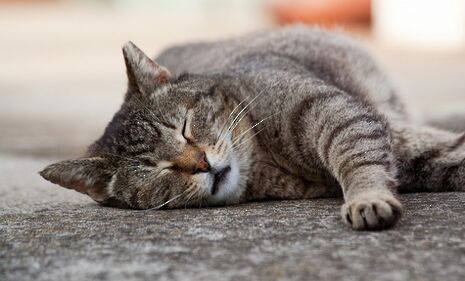Sleep deprivation: why it’s not worth losing the snoozing
Vidya Ramesh warns about the effects of insufficient shut-eye on your ability to get anything done

For a university student, I’ve been going to bed pretty early. I’ve getting up pretty early too. I’m not a rower, nor am I a NatSci with the dreaded daily 9 ams. You might think that that is pretty good, pretty admirable even. Think again.
Up until the start of this term I never stayed awake beyond one o’clock at the very latest; it was more likely that lights would be switched off by midnight. Yet without fail I would be up the next morning by 5 or 6 am. It all sounds very disciplined and admirable, but shift everything forward by three hours and it’s just as bad as going to bed at 4 am and getting up at nine or ten o’clock in the same morning, every day.
I have always been an early riser, but it was only at Cambridge that the concept of “5-hours-sleep-a day” kicked in. And this was without caffeine (well, part from a mug of green tea in the morning). Nor was I (or will I ever consider) taking ProPlus or any other brain stimulants, I hasten to add.
At first, I felt invincible. It was Michaelmas Term. I had nineteen hours in the day all to myself: more than enough to read up to a quarter of the books on my reading list, drag myself to a lecture, write up an article for Varsity, go to the gym if I wasn’t feeling too lazy, make a quick trip to Sainsbury’s, indulge in a three-course Formal Hall and hit Cindies afterwards with my mates.
So why did I stop? And why did it take so long for me to realise that what I was doing was simply unsustainable? I only threw my alarm clock into the trash last week. Looking back, it was remarkable that I didn’t do it sooner. But the tell-tale signs that you aren’t getting enough sleep are harder to detect and make themselves manifest a lot slower than most people realise.
During much of my four months or so of five hours sleep, I never looked that much worse for wear. I give credit to the blustery East Anglian winds for making my complexion look rosy and flushed upon walking back from a lecture, even though a lack of sleep has been proven to contribute towards the premature aging of the skin.
In the mania of Freshers’ Week and in the hurry to send Facebook friend requests to each wonderful person that had redirected me to the right building as I traipsed cluelessly around Cambridge, I was spending a lot more time in front of the screen than I had anticipated. This was compounded by the fact that many of the titles on my reading list were journal articles. So I would start checking Facebook whilst I was working. If I had a pesky case of drooping eyelids, a guilty scan of the Daily Mail sidebar and some riveting headline about the ever-multiplying Kardashian clan would be enough for them to snap back open. Never mind that work which was supposed to take one hour ended up taking three.
I would relentlessly badger my friends with the question, “How are you so good about procrastinating?” They would look at me nonplussed when I confirmed that I had already tried the usual tricks of the trade (switching off the WiFi, putting my phone on flight mode etc.) They were not able to solve my quandary in the end; how could they when none of them were suffering from as acute a level of sleep deprivation as me?
Research just published by the University of California has been unprecedented in the strength of the correlation it has ascertained between sleep-deprivation and compulsive Facebook checking. If it had only come out a few months before, I often ruefully cogitate. For me, the absurdity of it all finally hit home when faced with mock examinations at the start of Lent Term, I did start resorting to black coffee; more specifically walking over to the Divinity Faculty after a lecture simply to make use of the saintly dispension of free tea and coffee in the lobby.
I don’t regret my 5-hours-sleep-a-day experience. At least having gone through it I won’t be tempted to do the same later on, whether in my finals or when I start working. I may have lost a few extra hours in the day, but do I really want three more hours in which I could be working? Honestly, I probably am reading slightly less for my supervisors than I did when on five hours of sleep. But I am now working more efficiently: I am writing up articles for Varsity faster, I am spending less time dawdling in Sainsbury’s. And yes, procrastination on Facebook, whilst still stubbornly clinging to my list of bad habits, takes up much less of my time than it once did. Good riddance to the alarm clock. Now if you’ll excuse me, it’s time for my afternoon nap.
 News / Report suggests Cambridge the hardest place to get a first in the country23 January 2026
News / Report suggests Cambridge the hardest place to get a first in the country23 January 2026 Comment / Cambridge has already become complacent on class23 January 2026
Comment / Cambridge has already become complacent on class23 January 2026 News / Students condemn ‘insidious’ Israel trip23 January 2026
News / Students condemn ‘insidious’ Israel trip23 January 2026 News / Cambridge ranks in the top ten for every subject area in 202623 January 2026
News / Cambridge ranks in the top ten for every subject area in 202623 January 2026 Comment / Gardies and Harvey’s are not the first, and they won’t be the last23 January 2026
Comment / Gardies and Harvey’s are not the first, and they won’t be the last23 January 2026









